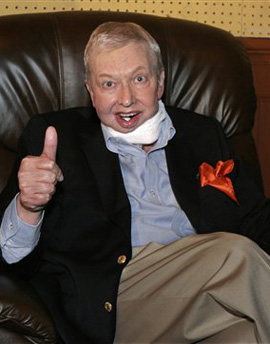Listening to Roger Ebert
by Beth
 It took a year for me to go from seeing spots to being completely blind. During those twelve months, my husband Mike and I were determined to keep doing all the things we’d enjoyed doing together when I still had 20/20 vision.
It took a year for me to go from seeing spots to being completely blind. During those twelve months, my husband Mike and I were determined to keep doing all the things we’d enjoyed doing together when I still had 20/20 vision.
Going to movies, for example.
Early on I was still able to see Prince’s body in “Purple Rain.” I saw Darryl Hanna’s fin in “Splash.” I remember the round hat on the little Amish boy in “Witness.” My eyesight diminished farily quickly, though. Eventually the screen went totally black. Nothing the doctors could do. I gave up on movies.
But then film critic Roger Ebert started his Overlooked Film Festival in Urbana, Ill., where we were living at the time. The before-and-after lectures helped explain what everyone was seeing, making the overlooked films more accessible to people like me. My guess is Roger didn’t have people with disabilities in mind when he decided to host talks and panels before and after films there, but I’m sure he was pleased to know that those discussions turned out being “universal design.”
Roger Ebert’s Film Festival, affectionately known as “Ebertfest” by locals, helped me realize I can still appreciate movies. Among my favorite Ebertfest overlooked films: Murderball, The Secret of Roan Inish, and American Movie.
I was in the audience at another event that could have just as well been called “Ebertfest,” too: Access Living gave him a “Lead On!” award at their 2011 gala here in Chicago. Access Living is a disability advocacy organization, and the “Lead On!” award recognizes national leaders who have helped reframe the understanding of people with disabilities and who have helped to remove the barriers-physical and attitudinal-that exclude people with disabilities from career pursuits and everyday life.
Roger Ebert represented the very embodiment of what the award stands for. Thyroid cancer left him unable to speak. He had no lower jaw, and friends told me his face could be difficult to look at. Others might have stayed inside, slow down, retired. Not Roger. He kept on doing the work he loved-reviewing movies, blogging, Tweeting, attending film festivals, sending numerous entries into the New Yorker’s Cartoon Contest and continuing to manage his own festival, too.
Roger Ebert used a text-to-speech program called “Alex” to make presentations at film festivals and conferences. “For me, the Internet began as a useful tool and now has become something I rely on for my actual daily existence,” he told an audience at a 2011 Ted Conference, explaining why he considered himself fortunate to be born in this era. “[If this had happened before], I’d be isolated as a hermit; I’d be trapped inside my head. Because of the digital revolution, I have a voice, and I do not have to scream.”
Thank you for your courage and your fortitude, Mr. Ebert. We sure are going to miss you — all of us benefited from hearing your voice.






